Spelling an end to loneliness among neurodivergent children, the city now has a one-of-a-kind app to organise playdates, as well as other initiatives that offer games, sports, and camaraderie—making for happier, more confident kids
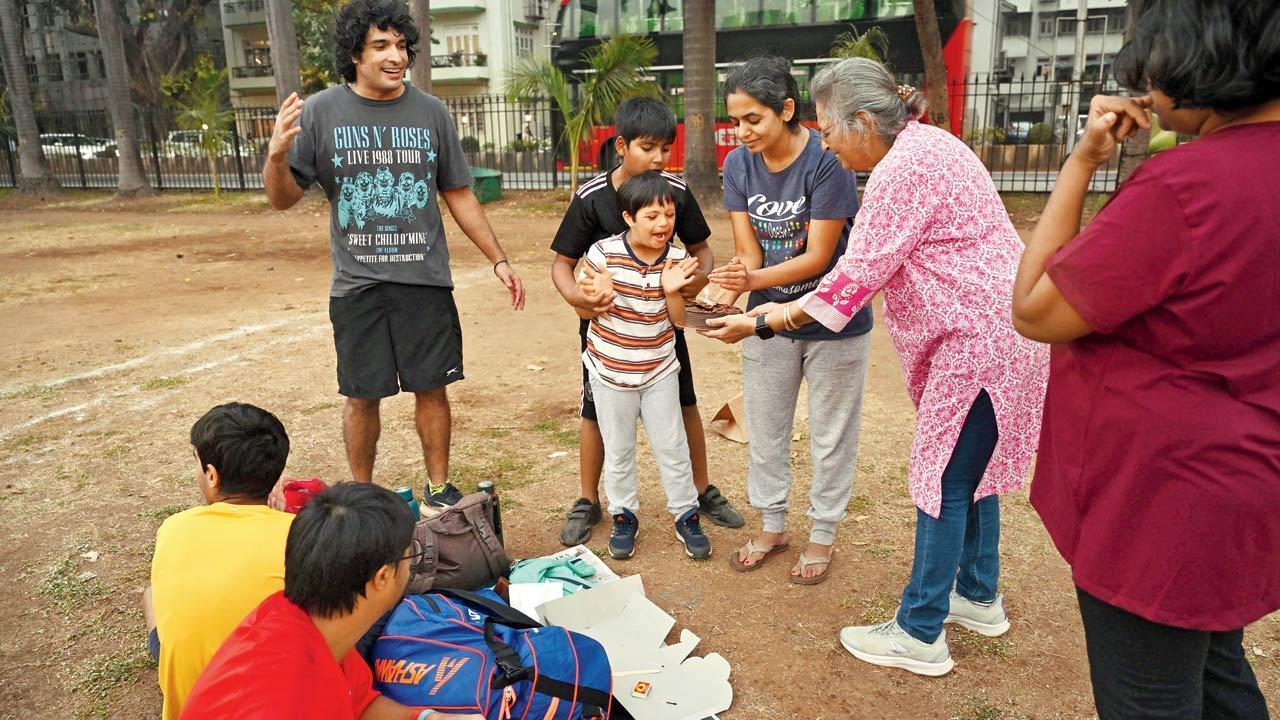
The bootcamp session takes place at Oval Maidan every Wednesday and Saturday. Pic/Atul Kamble
Two boys whisper into each other’s ears, they seem to have developed their own language—not all of it is in words. Mihaan Gandhi and Vir Kapoor, both 19, sit on a small picnic blanket at the Oval Maidan on Wednesday, their exchange of secrets overheard by none save the Rajbai Clock Tower looming in the background.
ADVERTISEMENT
The inseparable duo first met at the age of 15, back in October 2020, when the city saw its first relaxation of the COVID-19-induced lockdown. Their mothers
Moneisha Gandhi and Gopika Kapoor had been trying to set up a playdate for the two neurodivergent children, who were “very very alone”. “We had been trying to get them to meet for a few years but something or the other would come up. Gopika, too, was a bit hesitant after past experiences,” says Gandhi, when we meet her and Kapoor at the latter’s home in Parel.
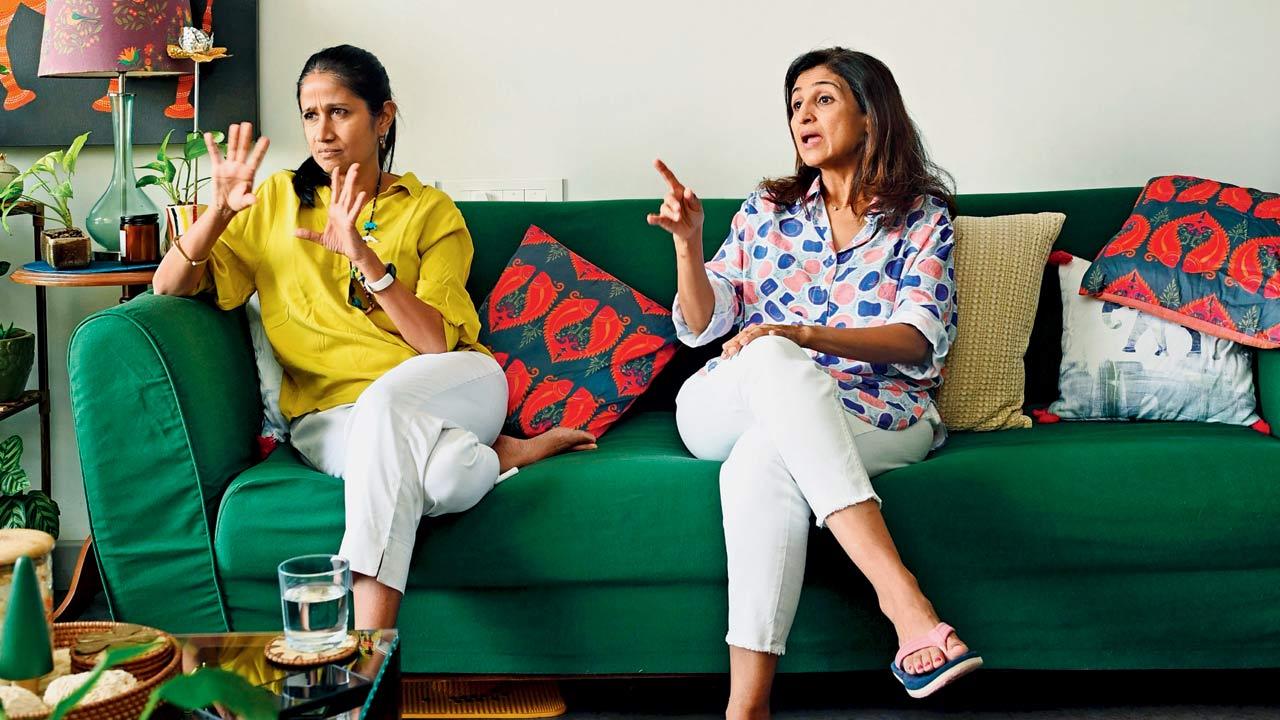 Moneisha Gandhi (left) and Gopika Kapoor launched Buddy Up, an app to set up playdates for neurodivergent children. Pic/Satej Shinde
Moneisha Gandhi (left) and Gopika Kapoor launched Buddy Up, an app to set up playdates for neurodivergent children. Pic/Satej Shinde
The camaraderie and trust rooted in their shared experiences as parents to neurodivergent or ND children is evident in the harmony between Kapoor’s loud energy and Gandhi’s serene yet determined poise. “Yes, Vir had been on a few other playdates in the past that were extremely stressful,” says Kapoor, whose son is Vir is an high functioning autistic. Gandhi’s son, on the other hand, is diagnosed with Down’s Syndrome.
“On their second playdate,” recalls Gandhi, “We had set up the kitchen for them to make rainbow pancakes. They tasted like s**t, but while the boys were making them, Mihaan looked at us sitting around and chatting away, and said something like, ‘Oh, look at our couch potato moms’, which cracked Vir up. They haven’t looked back since.”
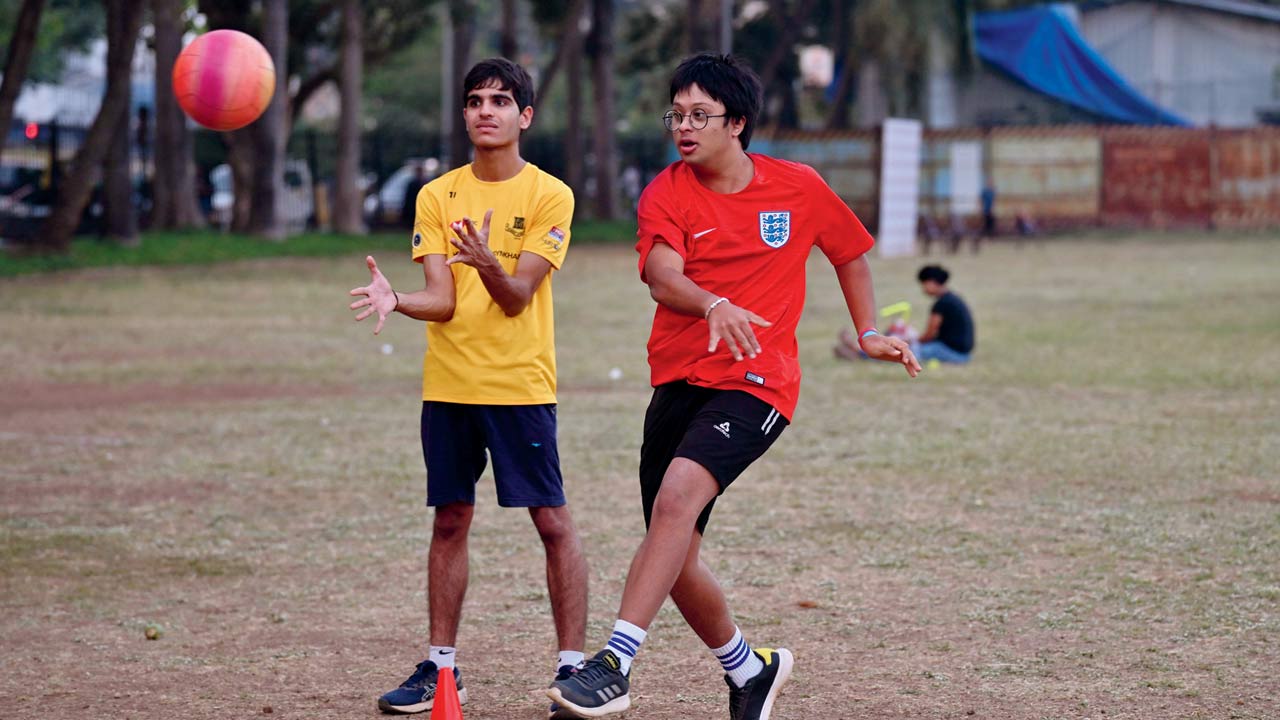 (Left) Vir Kapoor and Mihaan Gandhi are the inspiration behind the Buddy Up app. Pic/Atul Kamble
(Left) Vir Kapoor and Mihaan Gandhi are the inspiration behind the Buddy Up app. Pic/Atul Kamble
In the last four years, both Kapoor and Gandhi feel that they have been more experimentational with their activities like heading out to dancing more, especially Vir who can outdance almost anyone informs Gopika. Both the friends are now a part of Skill Shakti Community that help with finding a skill that the boys are interested in and will make them employable as well.
As their sons went from lonely boys to happier, more confident teens, both moms began thinking about how they could help other moms bring about this transformation in their ND children too. Their efforts culminated in the September launch of Buddy Up, an app to connect children with disabilities—be it cognitive or physical—for meet-ups.
 Aaryav Mehta (l) and Rustom warden, during the bootcamp where the former cut cake for his ninth birthday
Aaryav Mehta (l) and Rustom warden, during the bootcamp where the former cut cake for his ninth birthday
“One of the biggest problems that children with any disability face is the lack of opportunities to make friends or lack of spaces to be social in the largely neurotypical world,” says Gandhi.
Loneliness may be a universal problem in this day and age, but it has an especially devastating effect on disabled people, found a survey [from which year] by the Belonging Forum at the Samuel Centre for Social Connectedness, a British organisation that studies social isolation. In the study, conducted across 10,000 people across the UK, four out of 10 people living with disabilities reported experiencing loneliness, compared to three in 10 (29 per cent) non-disabled respondents.
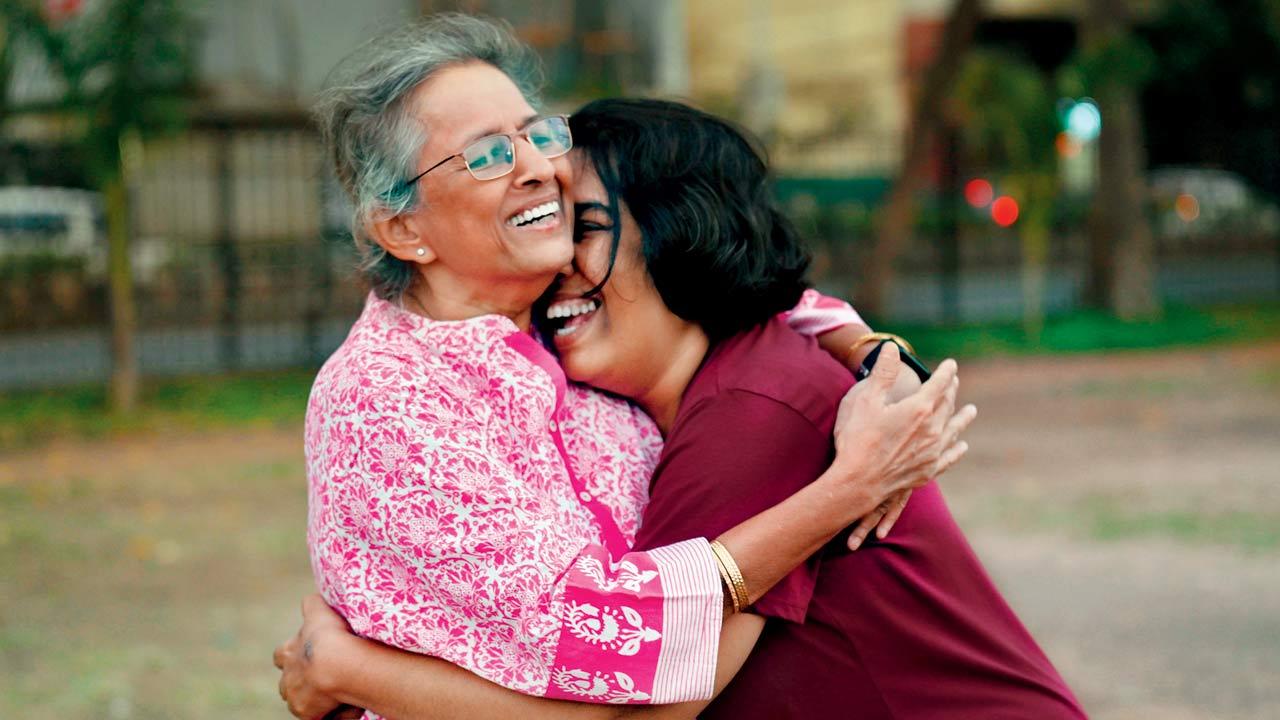 Sangita Kamdaar with her daughter Shreya at bootcamp. Pics/Atul Kamble
Sangita Kamdaar with her daughter Shreya at bootcamp. Pics/Atul Kamble
In the same poll, 14 per cent disabled respondents reported no close friends at all. In 2023, the UK-based Swansea University conducted a study on the impact of loneliness on autistic people, and found that 26.7 per cent autistic respondents reported loneliness, compared to 19.9 per cent non-autistic people. Quite tellingly, the study is titled I’m Trying to Reach Out, I’m Trying to Find My People.
Aalap Deboor, was diagnosed with autism as a adult. The filmmaker and musician went on to co-found Much Much Media as a result of his diagnosis, and makes short films about those on the spectrum and their experiences. One of the big talking points in his films is friendship, or the lack thereof. “One of the things I experienced growing up is that I had mostly had younger children as my friends,” he says. This is called incidental friendship in the neurodivergent world,” says Deboor. “Children on the spectrum are often friends with either those who are much younger, sometimes even by eight years or more, or then much much older, say by five years or more,” he says. Friendships among peers is usually harder because of a lack of patience or emotional maturity.
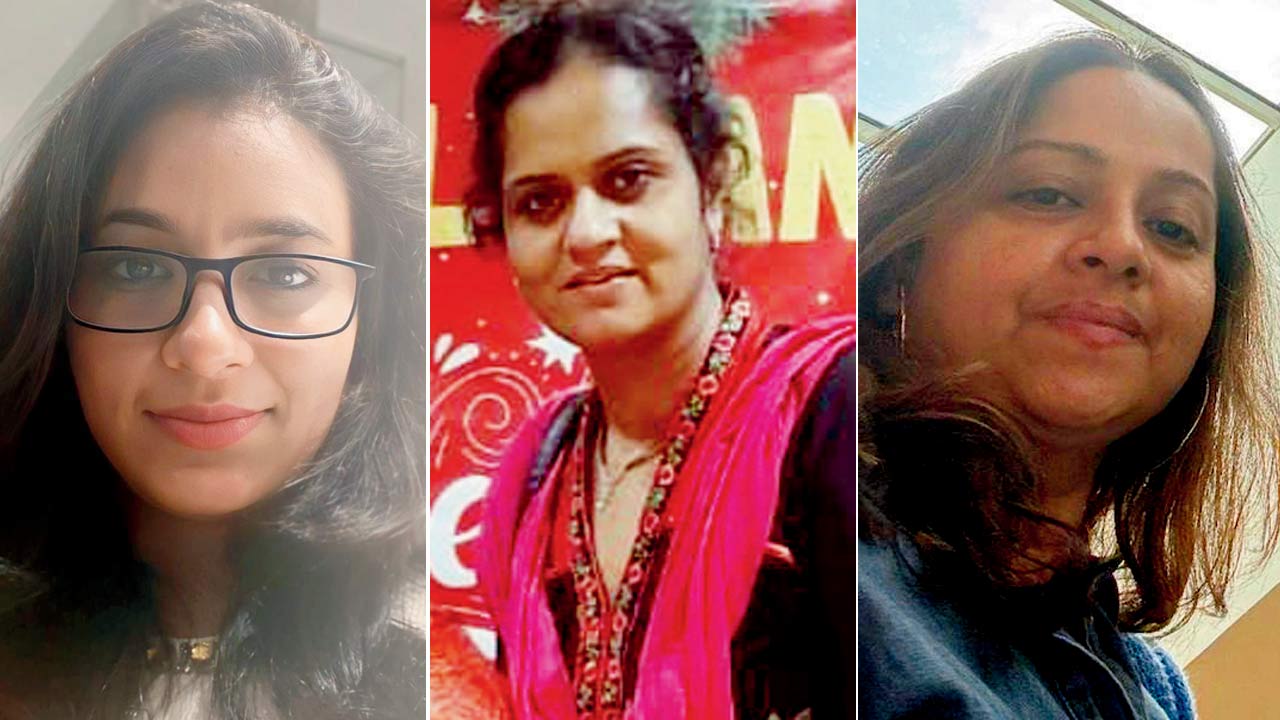 Tripti Goenka; Shetty Supriya and Tripti Goenka
Tripti Goenka; Shetty Supriya and Tripti Goenka
Sometimes, the solution can be as simple as pairing children with complementary conditions. “Often we do not realise the advantages of pairing children with cross disabilities,” says Kapoor, “For example, a high-functioning autistic child can be paired with another high-functioning autistic child or a non-verbal autistic child with another non-verbal child. But when Mihaan and Vir met, we realised that they brought different strengths to the table and it made for a wonderful partnership.”
The boys have complementary strengths, she points out. While Vir might not make eye contact when he meets someone for the first time, Mihaan is outgoing and ready with a ‘Hi!’. On the other hand, navigating Google Maps and figuring out a new location is Vir’s forte.
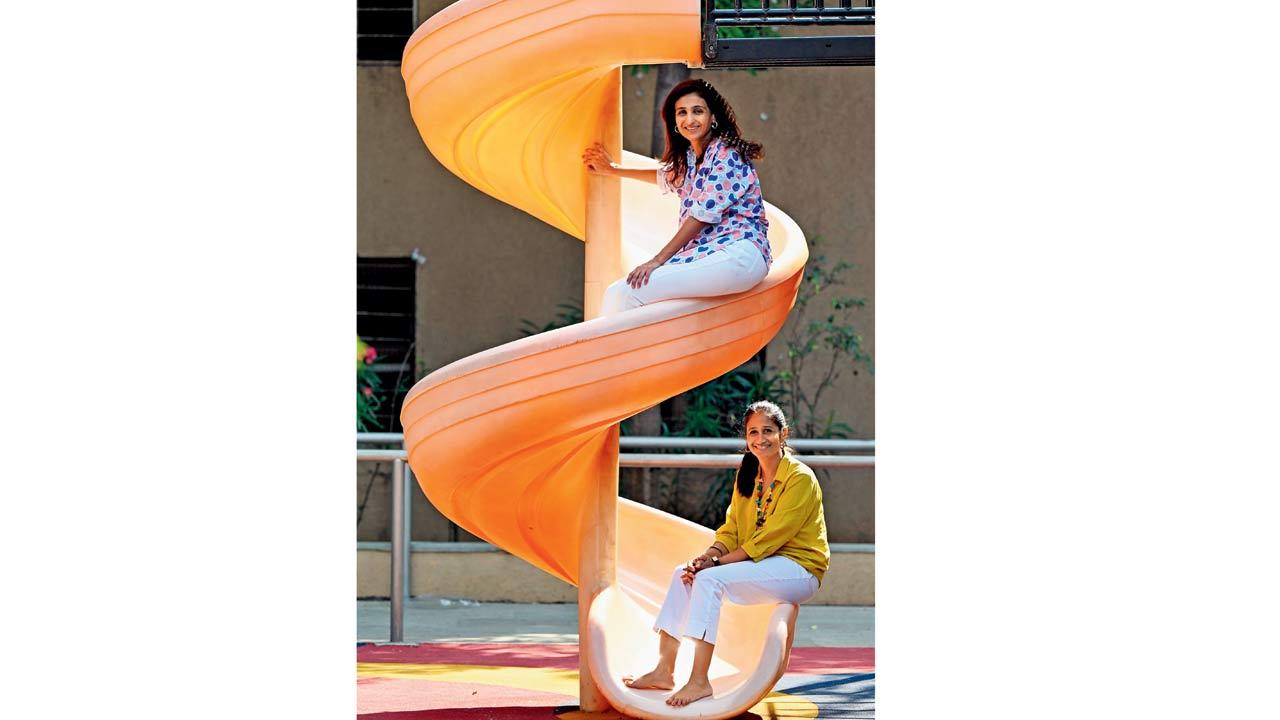 Gopika Kapoor (up) and Moneisha Gandhi, who launched the Buddy Up app to set up playdates for neurodivergent children. Pic/Satej Shinde
Gopika Kapoor (up) and Moneisha Gandhi, who launched the Buddy Up app to set up playdates for neurodivergent children. Pic/Satej Shinde
Buddy Up now has around 1,700 users across India and sees traffic of 500 chats per day. “We even have some people from Bengaluru who have messaged us saying that they connected with someone in their city via the app. Slowly, more and more parents are finding out about the app, but for us, it’s still not enough,” says Gandhi, a Colaba resident.
On Wednesday evening, winter temperatures finally set in at Oval Maidan, where we shadow Vir and Mihaan as they meet up for another initiative—a boot camp—bringing neurodivergent children from the city together.
 Special Hangout activities being conducted with ND children and the forum has also become a safe space for their parents
Special Hangout activities being conducted with ND children and the forum has also become a safe space for their parents
Organised twice a week by Rustom Warden, a physical trainer for over two decades, the bootcamp features physical activities and games such as football, throwball or just run around aimlessly to expend energy that otherwise has no outlet.
“I started the boot camp back in 2016 for all children. It just so happened that neurodivergent kids found their way to the sessions. The fact that they are under no pressure to ‘perform’ led to its growing popularity among them,” says Warden, as he rounds up all the children for a group picture, insisting that we photograph them together instead of his solo image.
Among the bootcamp participants is birthday boy Aaryav, who lives with Down’s Syndrome and turned nine years old a week ago, but chose to celebrate with his friends at the camp. He is quite upset that we have intervened in his cake-cutting time. He refuses to pose for the group photo, despite his mother Puja Mehta trying all the tricks in her bag. “Aaryav,” he spells his name out for us when we got it wrong.
“This is a safe space where these kids can just be themselves. “This boot camp is like a magic pill,” says Mehta, as she flits across the sandy maidan behind Aaryav, feeding him cake.
At 41, Shreya Kamdaar is the oldest neurodivergent participant at the camp. She is accompanied by her mother, Prof Dr Sangita Kamdaar a retired economics teacher. “Didi, come have cake,” Shreya invites us, holding our hand and swaying to silent music while she laughs at our half of a two-step routine.
“I think Shreya is the oldest in this group,” says Kamdaar, a resident of Nana Chowk, “We have been coming here for the last seven months and it’s been phenomenal. Better than a lot of therapy that we have been doing for Shreya.”
What about the impact on Shreya? “She is more interested in activities in general. I’ve noticed more enthusiasm in her, it’s almost given her a new lease on life in the past few months,” says her mother.
“[Organiser] Rustom is patient with them, without ever making anyone feel that he is doing them a favour—it’s just genuine love and joy. My child—even in her 40s—doesn’t have a lot of friends. But since we’ve been coming here, there is a sense of confidence and pride in her that I can sense as a parent,” adds Kamdaar.
Ritu Vig recalls how her elder son Kritin, 22, who is on the autism spectrum, was upset when younger brother Pranit [his age] started spending more time outside the house, hanging out with friends and going to the movies. “He would ask me, ‘When will I make friends, Mumma?’”
This led to Vig launching Special Hangout, a community for neurodivergent children that is now 350 families. It started in 2022, when Vig reached out to people to plan a bus trip for ND children. In no time at all, three buses full of people that wanted to be a part of the initiative.
Special Hangout now has multiple programmes like workshops, art exhibitions, autism seminars, and also facilitated the sale of neurodivergent children’s work at the Kala Ghoda festival. There are also social activities for festive seasons, including Diwali parties, dandiya during Navratri and an upcoming Christmas party on December 18.
While she is based in South Mumbai, Vig is trying her best to include more parents from as far as Thane and Mira Road as well, although logistics remain a challenge.
“My son is a different person since he has been a part of Special Hangout,” says Vig, “He is confident and it’s actually fun for me to witness, because he has an attitude that will make you feel that he is the one who runs Special Hangout—and that is the very intention of the community.”
She shares that a lot non-verbal children on the spectrum have often bloomed due to the socialisation at these events, as there is no structure and no pressure to perform. “One of these events is a Saturday music therapy class that is actually headed by [bootcamp organiser Rustom] Warden,” she adds.
Inspired by his elder brother, the younger Pranit too has now founded a new wing under the initiative—christened Special Buddies—which is a buddy system that pairs ND children with neurotypical kids.
These communities are just as much a respite for the parents and caregivers as they are for the children.
Tripti Goenka, 44, is emphatic when she says that Special Hangout is more about finding a space for herself. “I had to eventually give up my job to take care of my son [his age, diagnosis]. Special Hangout, for me, is a space where I can be me. I do not have to worry about whether my child is ‘fitting in’, in the neurotypical way, and that’s a big relief,” she says.
This relief may come in different forms and for different reasons for the parents. For Supriya Shetty, it is the relief of watching her son Jay, 17, with autism finally connect with children his age.
Jay has been a part of Special Hangout since its inception. “He looks forward to Special Hangout more than going to school,” says Shetty, “At home, he is quiet, but if he hears that they are hosting a party, he will go on talking about it. After the party, he comes home and describes everything to his grandmother.”
Like many ND children, Jay has difficulty communicating with neurotypical kids his age. “He often tends to just stand quietly, but he notices everything. He will come home and talk about the children but doesn’t interact with them, since the most common reaction to him in the past has been ‘Pagal hain’. His friendships at Special Hangout have been deeper,” adds Shetty, who pulled Jay out of a “mainstream” school in March this year, after he had anxiety attacks while appearing for his pre-National Institute Of Open Schooling (NIOS) for his 10th standard examination.
Difficulties integrating in mainstream schools is a common issue, which is why these community outreaches are all the more important as safe space for these children to mingle and expand their social circle and skills.
Suchita Bhatia, whose 16-year-old son Neev was diagnosed with global developmental delay, was a fashion merchandiser in another lifetime, but has switched to working full-time on neurodivergent community outreach.
Neev is non-verbal, but is a very social person, she says. “Non-verbal” is a term used to describe a subgroup of people with autism spectrum disorder (ASD) who never learn to speak more than a few words. An estimated 25 to 35 per cent of autistic children are considered non-verbal.
“In school, they often club people with similar learning disabilities together. However, places like Special Hangout allow him to mingle with a wider spectrum of kids. He is more than happy to be friends with eight-year-olds. He is a non-verbal child but is very expressive,” adds Bhatia, a resident of Malabar Hill.
He for example is vocalises a lot when he meets someone for the first time. “Traditional schools and colleges don’t know how to assimilate neurodivergent children into their system and we are working towards that goal. We know that our children need to have the social skills to face the world,” says Bhatia. Neev is now studying at Nana Chowk at the Mariposa Foundation.
There are some parents who do not prefer specialised learning spaces, fearing this will increase isolation of their children who can otherwise be integrated into society. Asha Matale, 55, an independent journalist, enrolled her 21-year-old autistic son Maitreya in traditional schools and now a mainstream college. “For learning in the initial years, special spaces are okay. But in teenage years, they yearn to be part of the mainstream. It comes with its challenges and I do understand that some neurodivergent children cannot be sent to regular schools. But otherwise, I believe that inclusion helps hugely,” she says.
“They [ND teens] do learn a lot from neurotypical peers. We can try to teach them important life lessons like how to tell the difference between a friend genuinely interested in them versus someone who is just taking advantage of them. These are hard lessons that we need to enable our children with so they survive long after us,” says the Vikhroli resident.
Maitreya has gone through the gambit of emotions that come with socialising with neurotypical people, from depression to heartbreak and finally acceptance in the one recent friend he has found in his college.
For other neurodivergent children and young adults in the city—whether they attend special learning or traditional schools—initiatives such as Buddy Up, Boot Camp, and Special Hangout offer the promise of friendship and an emotional support system that will hold them in good stead long after their parents are gone.
26.7%
autistic people say they are lonely
19.9%
non-autistic people who are lonely
*Source: 2023 study by Swansea University, UK
1,700
No. of users the Buddy Up app has got since September
Neurodivergence in Indian children
In a 2018 study ------The National Institutes of Health, USA, titled Neurodevelopmental disorders in children aged 2-9 years: Population-based burden estimates across five regions in India, the researchers posited that approximately 12 per cent of children between the ages of two and nine years in India have some form of neurodevelopmental disability. This includes attention deficit/hyperactivity disorder (ADHD), autism spectrum disorders (ASD), and learning disorders.
How to contact
Special hangout: www.SpecialHangout.org
Buddy up: Available on Playstore
Bootcamp: insta: @bootcampbythebay
 Subscribe today by clicking the link and stay updated with the latest news!" Click here!
Subscribe today by clicking the link and stay updated with the latest news!" Click here!







